- Home
- Bertolt Brecht
Bertolt Brecht: Mutter Courage und ihre Kinder 2
Bertolt Brecht: Mutter Courage und ihre Kinder 2 Read online
Bertolt Brecht
Collected Plays: Two
Man equals Man, The Elephant Calf
The Threepenny Opera
The Rise and Fall of the City of Mahagonny
The Seven Deadly Sins
Set in British India, Man equals Man deals with the forcible transformation of a civilian docker, Galy Gay, into a perfect soldier. Using Kiplingesque vocabulary and imagery, Brecht explores the notion of personality as something adjustable: Galy Gay is ‘dismantled like a car’ and re-assembled as a different person. Also included is The Elephant Calf, ‘an interlude for the foyer’, originally an integral part of the main play.
The Threepenny Opera, immortalised by its songs to Kurt Weill’s music, was Brecht’s first commercial success; based on John Gay’s 18th-century Beggar’s Opera but set in a mock-Victorian Soho, it makes Macheath into a gentleman crook, an incarnation of the bourgeois values Brecht so distrusted.
The Rise and Fall of the City of Mahagonny stems from the same period of creative collaboration between Brecht and Weill. Mahagonny is a fictional boom town born of Brecht’s love-hate with the mythology of America – a ‘net-city’ founded to catch all comers.
Brecht’s supremely ironic ballet libretto, The Seven Deadly Sins, is the story of two sisters who, in seven years, traverse seven cities, and are tempted in each by one of the seven deadly sins.
The volume, edited by John Willett and Ralph Manheim, includes Brecht’s own notes and relevant texts as well as an extensive introduction and commentary.
Bertolt Brecht was born in Augsburg on 10 February 1898 and died in Berlin on 14 August 1956. He grew to maturity as a playwright in the frenetic years of the twenties and early thirties, with such plays as Man equals Man, The Threepenny Opera and The Mother. He left Germany when Hitler came to power in 1933, eventually reaching the United States in 1941, where he remained until 1947. It was during this period of exile that such masterpieces as Life of Galileo, Mother Courage and The Caucasian Chalk Circle were written. Shortly after his return to Europe in 1947 he founded the Berliner Ensemble, and from then until his death was mainly occupied in producing his own plays.
Other Bertolt Brecht publications by Bloomsbury Methuen Drama
Brecht Collected Plays: One
(Baal, Drums in the Night, In the Jungle of Cities, The Life of Edward II of
England, A Respectable Wedding, The Beggar or the Dead Dog,
Driving Out a Devil, Lux in Tenebris, The Catch)
Brecht Collected Plays: Two
(Man Equals Man, The Elephant Calf, The Threepenny Opera,
The Rise and Fall of the City of Mahagonny, The Seven Deadly Sins)
Brecht Collected Plays: Three
(Lindbergh’s Flight, The Baden-Baden Lesson on Consent, He Said
Yes/He Said No, The Decision, The Mother, The Exception and
the Rule, The Horations and the Curiatians, St Joan of the Stockyards)
Brecht Collected Plays: Four
(Round Heads and Pointed Heads, Fear and Misery of the Third Reich,
Señora Carrar’s Rifl es, Dansen, How Much Is Your Iron?,
The Trial of Lucullus)
Brecht Collected Plays: Five
(Life of Galileo, Mother Courage and Her Children)
Brecht Collected Plays: Six
(The Good Person of Szechwan, The Resistible Rise of Arturo Ui,
Mr Puntila and His Man Matti)
Brecht Collected Plays: Seven
(The Visions of Simone Machard, Schweyk in the Second World War,
The Caucasian Chalk Circle, The Duchess of Malfi )
Brecht Collected Plays: Eight
(The Days of the Commune, The Antigone of Sophocles,
Turandot or the Whitewashers’ Congress)
Berliner Ensemble Adaptations – publishing 2014
(The Tutor, Coriolanus, The Trial of Joan of Arc at Rouen 1431,
Don Juan, Trumpets and Drums)
Brecht on Art and Politics (edited by Tom Kuhn and Steve Giles)
Brecht on Film and Radio (edited by Marc Silberman)
Brecht on Performance: Messingkauf and Modelbooks – publishing 2014 (edited by
Tom Kuhn, Steve Giles and Marc Silberman)
Brecht on Theatre – publishing 2014 (edited by Marc Silberman, Steve Giles and Tom Kuhn)
Brecht in Practice – publishing 2014 (David Barnett)
The Craft of Theatre: Seminars and Discussions in Brechtian Theatre (Ekkehard Schall)
Brecht, Music and Culture – publishing 2014 (Hans Bunge, translated by Sabine Berendse and Paul Clements)
Brecht in Context (John Willett)
The Theatre of Bertolt Brecht (John Willett)
Brecht: A Choice of Evils (Martin Esslin)
Bertolt Brecht: A Literary Life – publishing 2014 (Stephen Parker)
A Guide to the Plays of Bertolt Brecht (Stephen Unwin)
Bertolt Brecht
Collected Plays: Two
Man Equals Man
translated by Gerhard Nellhaus
Original work entitled:
Mann ist Mann
The Elephant Calf
translated by John Willet
Original work entitled:
Das Elefantenkalb
The Threepenny Opera
translated by Ralph Manheim and John Willet
Original work entitled:
Die Dreigroschenoper
The Rise and Fall of the City of Mahagonny
translated by W. H. Auden and Chester Kallman
Original work entitled:
Aufstieg und Fall der Stadt Mahagonny
The Seven Deadly Sins of the Petty Bourgeoisie
translated by W. H. Auden and Chester Kallman
Original work entitled:
Die Sieben Todsünden der Kleinbürger
Edited and introduced by
John Willett and Ralph Manheim
Contents
Introduction
Chronology
THE PLAYS
MAN EQUALS MAN
THE ELEPHANT CALF
THE THREEPENNY OPERA
THE RISE AND FALL OF THE CITY OF MAHAGONNY
THE SEVEN DEADLY SINS OF THE PETTY BOURGEOISIE
NOTES AND VARIANTS
MAN EQUALS MAN
Texts by Brecht
The Man equals Man song
Press release
Epic sequence of events
Two paragraphs
Introductory speech (for the radio)
Dialogue about Bert Brecht’s play Man equals Man
Notes to the 1937 edition
On looking through My First Plays (v)
Editorial Notes
1. Evolution of the play
2. Notes on individual scenes
THE THREEPENNY OPERA
Texts by Brecht
Additional songs from ‘The Bruise’
Appendix
On The Threepenny Opera
Notes to The Threepenny Opera
Note by Kurt Weill
About The Threepenny Opera (a public letter)
Transcript
From a conversation between Brecht and Giorgio Strehler on 25 October 1955 with regard to the forthcoming Milan production
Editorial Notes
1. General
2. The 1928 stage script
3. From the stage script to the present text
THE RISE AND FALL OF THE CITY OF MAHAGONNY
Text by Brecht
Notes to the opera The Rise and Fall of the City of Mahagonny
Notes by Weill and Neher
Notes to my opera Mahagonny, by Kurt Weill<
br />
Introduction to the prompt-book of the opera Mahagonny, by Kurt Weill
Suggestions for the stage realisation of the opera The Rise and Fall of the City of Mahagonny, by Kurt Weill and Caspar Neher
Editorial Notes
1. Songs, Songspiel, opera
2. The opera: notes on individual scenes
Introduction
By Brecht’s own account, he ‘rewrote Man equals Man ten times’. Nearly all his plays were copiously revised, while there are two or three great unfinished works which he tussled with for years, leaving a mountain of paper for his interpreters to sort out as best they can. But of the completed plays only Galileo and The Good Person of Szechwan preoccupied him to anything like the same extent as this quite early piece. He wrote it over a period during which he was evolving rapidly, as was the whole German theatre of the time and (for better or worse) the Weimar Republic under which that theatre so flourished. And so, for all its surface flippancies, it may well be of lasting importance for the understanding of Brecht and his age. It is at once a vital piece of theatre and something like an archaeological site.
He started planning it when he was still a twenty-year-old student oscillating between Augsburg and Munich around the time of the end of the First World War. Two years later his early diaries show that he was writing the odd scene, very much in the spirit of his Augsburg poems:
Galgei was a solid citizen
His head was rather thick.
Some villains told him that he was
The butter merchant Pick.
They were such wicked people
To play this dirty trick.
Reluctantly he in the end
Became the wicked Pick.
How could he prove he wasn’t?
God left him high and dry.
His catechism hadn’t told
Him he was named Galgei.
The name might come in church lists
Or on his tomb perhaps?
The name Galgei however
Could be some other chap’s.
Citizen Joseph Galgei
Born April ’83
Devout and neat and honest
As God likes men to be.
So his original concept of a worthy Augsburg citizen persuaded to lose his own identity in favour of that of a missing butter merchant had something of the quality of his one-act farces at that time: of Lux in Tenebris and the other Bavarian sketches which he is thought to have written under the impact of the great Munich clown Karl Valentin. But before he had got very far with it Drums in the Night took priority, followed by In the Jungle of Cities which he started in the autumn of 1921, around the time of his first long visit to Berlin.
The Augsburg Galgei play, then, went into cold storage throughout the period of his first Munich successes. This was a time during which the German Expressionist theatre was expiring, along with the Expressionist element in Brecht’s own writing. When finally he moved to Berlin for good in the late summer of 1924 his work already had a much more urban, industrialised flavour to it – the transitional poem ‘Of Poor BB’ being crucial here – but Galgei was still high on the list of the tasks he had set himself. So too were a ‘Mahagonny opera’ and a vast plan for an urban trilogy of which In the Jungle would be the first section. The trilogy ran into difficulties, partly because the second play proved unexpectedly hard to write, but partly too, no doubt, because the production of In the Jungle with which the Deutsches Theater, Berlin, introduced its new dramaturg that October was not a success. At the same time his publisher was pressing him to complete his first book of poems, the Devotions, which he had promised them at least two years earlier, and to that end supplied him with an assistant called Elisabeth Hauptmann. It seems to have been her arrival, combined with the lack of any serious work to do at the Deutsches Theater, that decided the way in which he now set about Galgei, renaming it Galy Gay oder Mann = Mann.
In its second stage, then, Man equals Man, as we have called it, emerged not only as the first real product of Brecht’s Berlin period but also as the first work of what became known as the ‘Brecht collective’ – that shifting group of friends and collaborators on whom he henceforward depended. As such it mirrored the artistic climate of the middle 1920s, with their attitude of ‘Neue Sachlichkeit’ (or New Matter-of-Factness), their stressing of the collectivity and downplaying of the individual, and their new cult of Anglo-Saxon imagery and sport. Together the ‘collective’ would go to fights, not only absorbing their terminology and ethos (which permeates much of Man equals Man) but also drawing those conclusions for the theatre as a whole which Brecht set down in his theoretical essay ‘Emphasis on Sport’ and tried to realise by means of the harsh lighting, the boxing-ring stage and other anti-illusionistic devices that henceforward appeared in his own productions. Nothing could be less like the passionate, intensely egocentric gloom of so many Expressionist plays.
But there was another, perhaps even more important new element involved in Brecht’s changed approach to the Galgei project. This lay most obviously in the shedding of the original Bavarian background and the shifting of the basic theme of human identity to a new setting in British India, something that German audiences even today must find utterly exotic. The precedent here was of course the Chicago background adopted for In the Jungle; and the inspiration quite clearly came from Kipling, who had already played a rather more marginal part in the mishmash of literary influences that went to make up the earlier play. Thus the three soldiers who transform Galy Gay into their fourth man recall the classic ‘soldiers three’; the temple episode seems to echo the short story ‘Krishna Mulvaney’; the song ‘Johnny’ is the old Boer War song ‘Pack your kit and trek’ which Kipling cites in ‘Song of the Banjo’. And Brecht’s own songs too – both the Man equals Man song of the early versions and the Widow Begbick song – are redolent of Kipling (as our translation tries to bring out). This affinity was already there before Brecht’s move to Berlin, though at that point he had read Kipling only in German translation. But Hauptmann had studied English and acquired a real feeling for the language, and with her arrival the Kipling ties became more authentic. Nothing perhaps is more amazing to the English reader today than the quality of the soldiers’ language. And it is instructive to see how it accords with the echoes from Hasek’s novel, The Good Soldier Schweik, whose German translation had just appeared.
* * *
At the end of 1925 Brecht had the finished typescript bound up in red leather and gave it to ‘Bess Hauptmann’. ‘It was a troublesome play,’ said his covering note,
and even piecing together the manuscript from 20 lb of paper was heavy work; it took me 2 days, ½ bottle of brandy, 4 bottles of soda water, 8-10 cigars and a lot of patience, and it was the only part I did on my own.
Up to that moment it seems that there had been no definite prospect of a production, and the result was an enormously unwieldy play, in which the whole of The Elephant Calf, virtually as we now have it, formed the penultimate scene. Then in the course of 1926 two provincial theatres decided to stage it, and in the spring Brecht and Hauptmann reworked it yet again (‘for the seventh time, I think,’ said her diary for 30 April, ‘and some scenes even more than that’). This, as far as can be seen, is the text actually performed at the double première, which took place at Darmstadt and Düsseldorf on 25 September 1926. By then Brecht had been without regular employment for a year, while Hauptmann had gone on working for him for nothing after the previous publisher’s commission had run out.
The Düsseldorf production fell flat, but Darmstadt (which is only some seventeen miles from Frankfurt) was another matter. Here the director of the former court theatre was Ernst Legal, a man who like his successor Carl Ebert was soon to move to a key position in Berlin; and he brought in two of Brecht’s associates – the director Jacob Geis and the designer Caspar Neher – to take charge of the production, himself acting the part of Galy Gay. Visually it was most original: paper-thin, elegant, brilliantly li
t with whites and khakis predominating; this was also the first time that Brecht’s characteristic half-height curtain was used. Jazz music was played by Widow Begbick’s three (subsequently eliminated) daughters. The Widow spoke her new Interlude speech with its key line ‘Tonight you are going to see a man reassembled like a car.’ Geis himself wrote in the Berlin theatre magazine Die Szene of his guiding aim
to show the play’s underlying sense by making the surface meaning as clear as possible. In other words, no implications, secrets, ambiguities, half-light; but facts, brilliant illumination, light into every corner, absence of feeling, no humour-with-a-catch-in-the-throat. The theatre considered as craft rather than art; avoidance of private affairs. These should make a secondary appearance, emerge as self-evident.
Though Geis advised them to get hold of this play the Berlin theatres were slow to take up the challenge. However, Alfred Braun’s still quite new drama department at Radio Berlin was more enterprising, and in March 1927 it broadcast a radio adaptation specially made by Brecht. Introduced by a critical notice in Der deutsche Rundfunk (roughly equivalent to The Listener) which presented the play ‘as the most powerful and original stage play of our time’, this was linked by anonymous announcements which, again according to the same critic, were not merely
a rehash of the stage directions in the book, but short sentences foretelling how the plot will develop, and reflecting something of the fairground barker’s technique or the film titles of earlier times. Being written by a poet, these announcements give the whole evening a new form and one congenial to the radio medium.
The critic was Kurt Weill, whose first contact with Brecht and his work this seems to have been. The Galy Gay was again Legal, the Begbick Helen Weigel, taking her first step on the road that led to her Mother Courage some twenty years later. The music was by Edmund Meisel, Piscator’s regular composer. The speech which Brecht wrote co introduce the broadcast (see pp. 263–4) reappeared almost unchanged as his contribution to the first programme of Piscator’s 1927-28 season, for which he was now acting as one of a ‘collective’ of dramaturgs. It shows him reconsidering the play in a new context of rapid technological advance, which seemed to demand just that malleability and relativity of human identity that its protagonist – for entirely different reasons – displays.

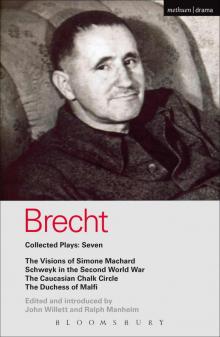 Bertolt Brecht: Mutter Courage und ihre Kinder 7
Bertolt Brecht: Mutter Courage und ihre Kinder 7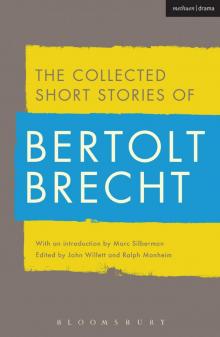 Bertolt Brecht
Bertolt Brecht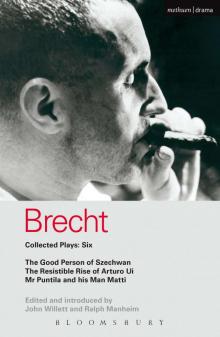 Bertolt Brecht: Mutter Courage und ihre Kinder 6
Bertolt Brecht: Mutter Courage und ihre Kinder 6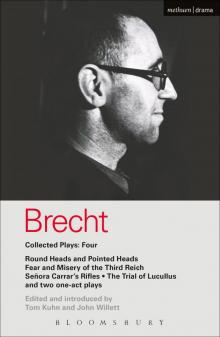 Bertolt Brecht: Mutter Courage und ihre Kinder 4
Bertolt Brecht: Mutter Courage und ihre Kinder 4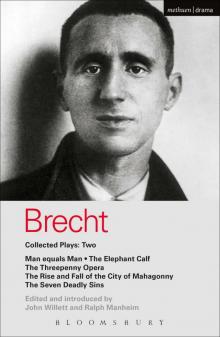 Bertolt Brecht: Mutter Courage und ihre Kinder 2
Bertolt Brecht: Mutter Courage und ihre Kinder 2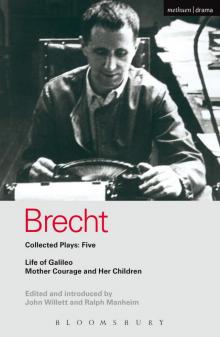 Bertolt Brecht: Mutter Courage und ihre Kinder 5
Bertolt Brecht: Mutter Courage und ihre Kinder 5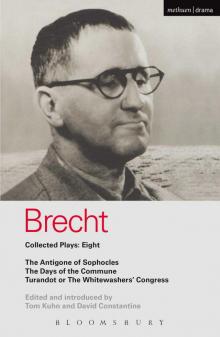 Collected Plays, Volume 4 (Bertolt Brecht: Plays, Poetry & Prose) 8
Collected Plays, Volume 4 (Bertolt Brecht: Plays, Poetry & Prose) 8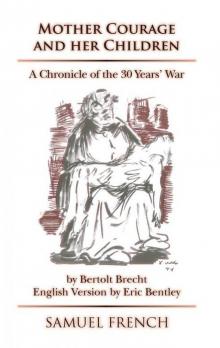 Mother Courage and Her Children
Mother Courage and Her Children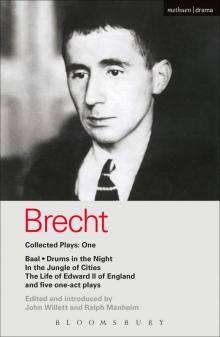 Bertolt Brecht: Mutter Courage und ihre Kinder 1
Bertolt Brecht: Mutter Courage und ihre Kinder 1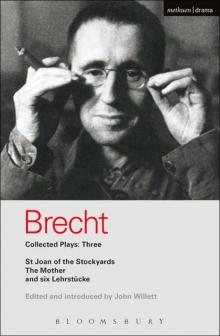 Brecht Collected Plays: 3: Lindbergh's Flight; The Baden-Baden Lesson on Consent; He Said Yes/He Said No; The Decision; The Mother; The Exception & the ... St Joan of the Stockyards (World Classics)
Brecht Collected Plays: 3: Lindbergh's Flight; The Baden-Baden Lesson on Consent; He Said Yes/He Said No; The Decision; The Mother; The Exception & the ... St Joan of the Stockyards (World Classics)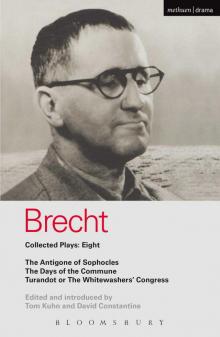 Brecht Plays 8: The Antigone of Sophocles; The Days of the Commune; Turandot or the Whitewasher's Congress: The Antigone of Sophocles , The Days of the Comm (World Classics)
Brecht Plays 8: The Antigone of Sophocles; The Days of the Commune; Turandot or the Whitewasher's Congress: The Antigone of Sophocles , The Days of the Comm (World Classics)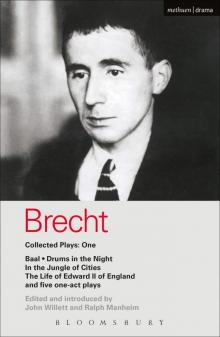 Brecht Collected Plays: 1: Baal; Drums in the Night; In the Jungle of Cities; Life of Edward II of England; & 5 One Act Plays: Baal , Drums in the Night , In the Jungle of Ci (World Classics)
Brecht Collected Plays: 1: Baal; Drums in the Night; In the Jungle of Cities; Life of Edward II of England; & 5 One Act Plays: Baal , Drums in the Night , In the Jungle of Ci (World Classics)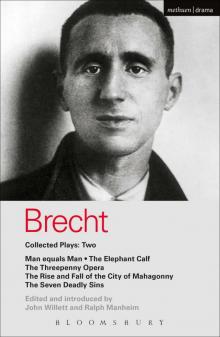 Brecht Collected Plays: 2: Man Equals Man; Elephant Calf; Threepenny Opera; Mahagonny; Seven Deadly Sins: Man Equals Man , Elephant Calf , Threepenny Ope (World Classics)
Brecht Collected Plays: 2: Man Equals Man; Elephant Calf; Threepenny Opera; Mahagonny; Seven Deadly Sins: Man Equals Man , Elephant Calf , Threepenny Ope (World Classics)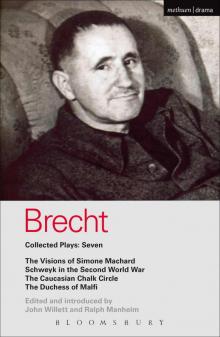 Brecht Collected Plays: 7: Visions of Simone Machard; Schweyk in the Second World War; Caucasian Chalk Circle; Duchess of Malfi (World Classics)
Brecht Collected Plays: 7: Visions of Simone Machard; Schweyk in the Second World War; Caucasian Chalk Circle; Duchess of Malfi (World Classics)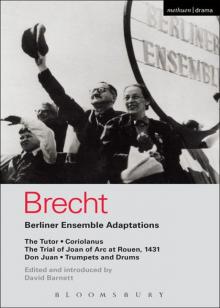 Berliner Ensemble Adaptations
Berliner Ensemble Adaptations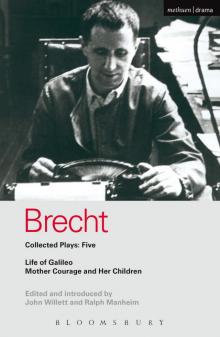 Brecht Collected Plays: 5: Life of Galileo; Mother Courage and Her Children (World Classics)
Brecht Collected Plays: 5: Life of Galileo; Mother Courage and Her Children (World Classics)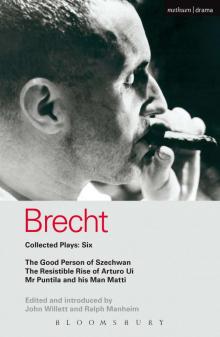 Brecht Collected Plays: 6: Good Person of Szechwan; The Resistible Rise of Arturo Ui; Mr Puntila and his Man Matti (World Classics)
Brecht Collected Plays: 6: Good Person of Szechwan; The Resistible Rise of Arturo Ui; Mr Puntila and his Man Matti (World Classics)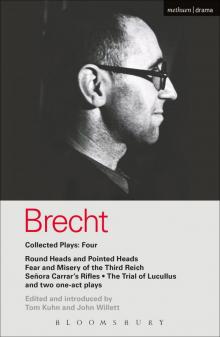 Brecht Collected Plays: 4: Round Heads & Pointed Heads; Fear & Misery of the Third Reich; Senora Carrar's Rifles; Trial of Lucullus; Dansen; How Much Is ... and Misery , Carr (World Classics)
Brecht Collected Plays: 4: Round Heads & Pointed Heads; Fear & Misery of the Third Reich; Senora Carrar's Rifles; Trial of Lucullus; Dansen; How Much Is ... and Misery , Carr (World Classics)